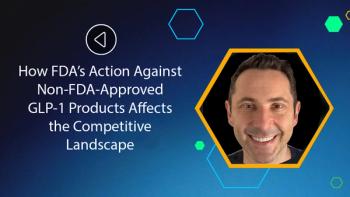
- Pharmaceutical Executive-12-01-2019
- Volume 39
- Issue 12
Lundbeck's Taj Bhardwaj: Market Access and Mental Health
Lundbeck executive Taj Bhardwaj talks about the differing mindsets necessary to lead local and global-level market access strategy in pharma-and how his current company is committed to stay in the fight to advance new treatments and break down stigmas in mental health.
Pharm Exec sits down with Lundbeck’s Taj Bhardwaj, who shares insights on the big-picture vs. short-term focus mindset of leading local and global-level market access strategy in pharma-and how his current company is committed to stay in the fight to advance new treatments and break down stigmas in mental health
Tajinder (Taj) Bhardwaj gained a Master of Science in Laboratory Medicine and Pathobiology at the University of Toronto, Canada, before going on to McMasters University (Hamilton, Ontario) to complete an MBA. After majoring in finance and serving an internship at Wyeth, Bhardwaj found that his skill set was
suited to the market access discipline. Beginning his pharma career as a health economics analyst at Bayer Inc. in Canada in 2006, over the next nine years Bhardwaj rose to the position of head of access strategy at Bayer Pharmaceuticals. After moving to Danish drugmaker Lundbeck in 2014 as senior director and head of global pricing, he was appointed the company’s vice president, global pricing and market access in January 2018.
Pharm Exec sat down with Bhardwaj to gather his thoughts on how the market access function has evolved during his career, how he made the shift from a country-specific to a global role, and the challenges and opportunities he faces leading the market access efforts of a company focused on brain disorders in a changing mental health space.
PE: How did your early experience in Canada prepare you for current position?
Bhardwaj: I started off at an affiliate level with Bayer and worked on several assets when I was at a local level. Canada happens to be a great breeding ground for market access. You can really develop your skill set and competencies because there is a plethora of different systems all rolled into one country. Each of the regions can make decisions independently, but there’s also a national health technology assessment (HTA) agency. So it was a great opportunity to really understand what market access and pricing are all about and how to manage the different dynamics.
Canada happened to be one of the front runners in HTA reform, back in 2004. So, when countries such as Germany had their HTA reform in 2011, and other countries started to adopt different practices, it became very easy to transfer my skill set to the European setting; there was a lot of overlap. Also, the healthcare systems in Canada and Europe are quite similar.
PE: How did you navigate that transition from a country-specific to global role?
Bhardwaj: On a country level, you tend to be very operational. You’re very much focused on filing the submissions, on speaking with the stakeholders. You do speak with stakeholders at a global level but it’s more on a strategic basis. You’re trying to identify the global positioning of the product and also allow for the flexibility that might be needed for local adaptation. You’re focused on providing a primary foundation, a starting point for everybody to work from.
Moving to a global level requires more big-picture thinking. You have to ensure that you’re able to position a product and produce a strategy that will allow the highest number of patients to benefit from it. At an affiliate level, you tend to have a more short-term focus, whereas at a global level, you’re not only thinking about the product in front of you, you’re also thinking about the future and how you shape the pipeline, how you shape the market understanding.
PE: What do you think have been the key changes in the market access field over the course of your career?
Bhardwaj: Very early on, there was a huge push and need for people to be competent with regard to healthcare systems, the technology assessment process, and how to move through the system. It was more administrative and technical. Once those competencies were developed, we got to the point of filing a submission, filing a written request for reimbursement. What I feel has been a slowly moving shift is in knowing how to ensure we are producing the right evidence that will meet the needs of our stakeholders,
and how that changes the complexities and the demand on the competencies that are needed.
Market access colleagues now need to be clinical trial specialists, talking about endpoints and statistical tests and managing expectations in terms of the magnitude of benefit. There are still those that want to pursue the “idealistic path” in terms of what an HTA or a payer is looking for, but that needs to balanced with commercial pragmatism, one that reflects on the risks of conducting certain studies. We need to know not only the limitations of our technologies, but also the limitations of how clinical trials are designed or of the instruments that are used to capture the value of our products. Working in market access has become a much more comprehensive, encompassing effort than it was before.
PE: How can those new market access competencies be fostered and sustained?
Bhardwaj: It has a lot to do with the dialogue that you have internally, cross-functionally. I can tell you first-hand, when I went from a country to a global level, I was following that idealistic path. But then I quickly saw the challenges and the limitations of pursuing that path. When individuals appreciate that, you can then start to collaborate more effectively with your colleagues on how to find alternative solutions.
On the external level, you need to constantly engage with the right stakeholders to talk about the value of products and how that value can be shared. It’s about engaging with medical associations, patient associations, HTA, payers; we’re all in this together. If we can have a very robust, transparent dialogue with each other, then we are on the right path toward a solution.
PE: Looking forward, what would you say are some of the market access barriers and opportunities you are facing?
Bhardwaj: I see the barriers and opportunities as linked. One of the heaviest challenges that we face, especially with Lundbeck being a company fully dedicated to mental health, is in elucidating and translating the value of our products. If we have a scenario where our products are improving cognition or allowing patients to get back to work, showcasing that value in a manner that is appreciated by our stakeholders is a challenge. And when we are able to produce that information, having our stakeholders appreciate it is also a challenge.
Many healthcare systems are not really focused on what worker productivity looks like. Say you have a patient suffering from anhedonia, they are not really costing the system any money because they’re sitting at home, they’re detached, they’re withdrawn from society. How do we provide benefits to such a patient where this spend might not necessarily be seen, where it is not appreciated by stakeholders who are focused on a drug or healthcare budget? I think that is a barrier, but at the same time it’s an opportunity.
PE: What keeps you motivated?
Bhardwaj: What has always motivated me in this space is the challenge. When you look at mental health and you look at Lundbeck specifically, we are one of the last remaining players in the space. Many companies have abandoned the space altogether, which is truly a shame because, more so than ever, you need a focus within mental health. Not only do you have the inherent challenges of market access, but you also have this a challenge of staying relevant on political agendas and making sure that mental health is not forgotten.
It’s almost as if there’s a view now that what we have is good enough. I can’t support that notion, because there’s so much more that needs to be done. I think that’s where my drive has always come from, to work for organizations that have that focus in mind, that have that desire to constantly innovate and add benefits to all stakeholders involved. That was one of the main things that attracted me to Lundbeck. I hadn’t worked in mental health up until then and I saw that many were abandoning it. That gave me more of a reason to want to join the fight and the challenge to keep it relevant and alive.
PE: People are talking about mental health more than they were 10 or 15 years ago.
Bhardwaj: You’re right, we are seeing more of a dialogue taking place. That has a lot to do with the stigma around mental health being lifted. But, let’s make no mistake, there is still a stigma. In certain markets, mental health is not discussed at all. And if it is, it’s portrayed in a different light altogether. The number of treated patients for depression in western countries, for example, is up to 40 times higher per capita than in China. That speaks volumes; in China there is a very large population, but the dialogue around mental health is still growing. So, you can imagine the energy and the resources that are needed to educate and to ensure that appropriate use of our products is taking place there.
More importantly, patients need to know that there are options for them and that they don’t need to suffer in silence or suffer alone.
I think that we are having very healthy conversations around mental health now and I continue to support them. I wouldn’t say that there’s one solution that will solve everything; I still think that we’re on that journey to find a way to bring all these different dimensions together.
Lundbeck is not only about one solution for a patient, it’s about being part of an ecosystem that ensures that individuals get the help that they need.
Julian Upton is Pharm Exec’s Online and European Editor. He can be reached at
Articles in this issue
about 6 years ago
Market Access: Employers as Barriers to Valueabout 6 years ago
The Route to Market Access in Europeabout 6 years ago
A Multi-Stakeholder Perspective On Assessing Drug Valueabout 6 years ago
When the Patient Loses in Market Accessabout 6 years ago
Making Sense of Copay Accumulatorsabout 6 years ago
Year in Review: R&D, Regulatory, and Reimbursement Hurdlesabout 6 years ago
Who’s Going to Choose Where to Launch a Drug?about 6 years ago
Back to the Basics?about 6 years ago
Pharmaceutical Executive, December 2019 Issue (PDF)about 6 years ago
Focus Report: Puerto RicoNewsletter
Lead with insight with the Pharmaceutical Executive newsletter, featuring strategic analysis, leadership trends, and market intelligence for biopharma decision-makers.




